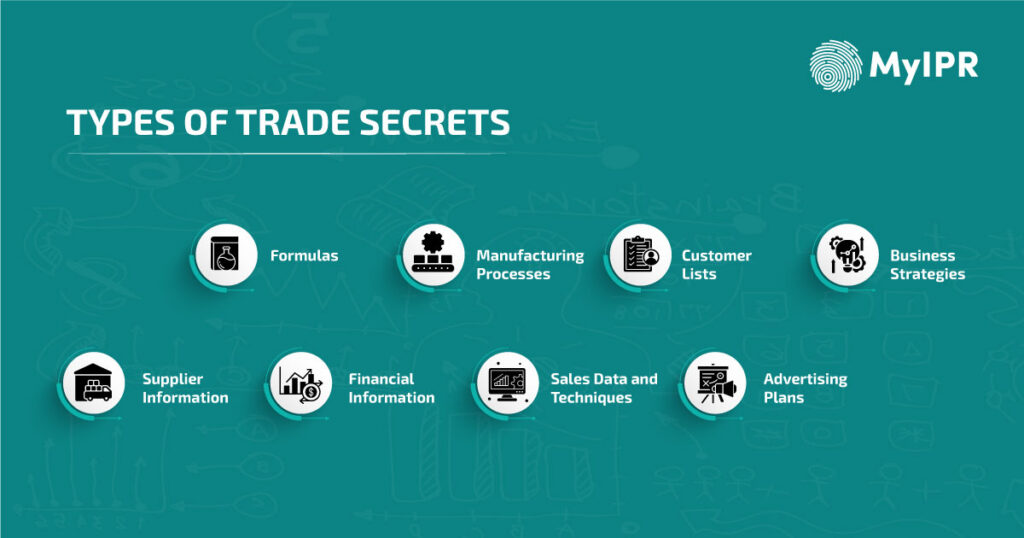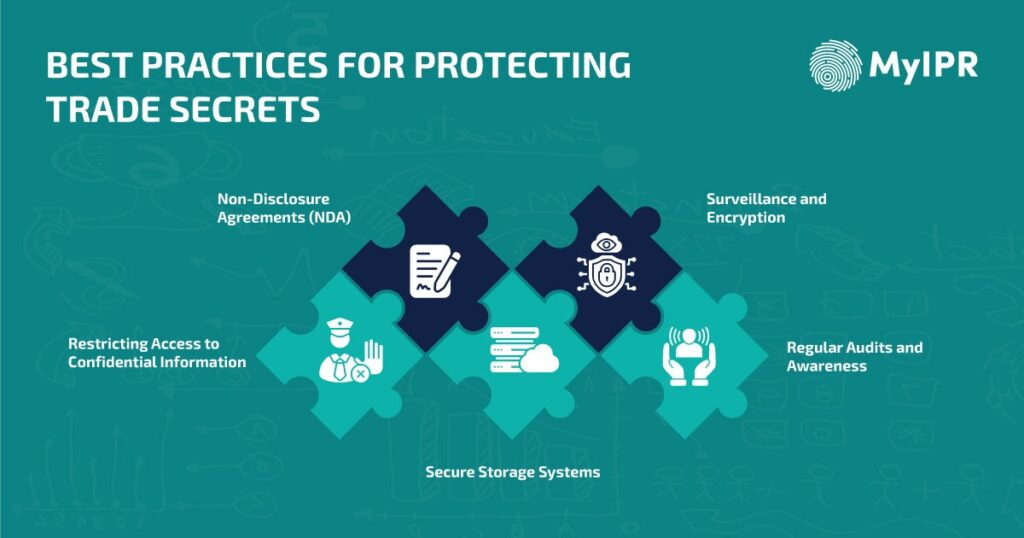
What Are Trade Secrets?
Trade secrets are types of intellectual property rights (IPR), referring to confidential business information. This information can provide a competitive advantage over others and can establish brand identity in the market. Further, trade secrets are not publicly accessible and are maintained under strict confidentiality.
Types of Trade Secrets
Trade secrets are one of the intellectual property protections that play a key role in maintaining a company’s competitive edge and helping it in its long-term success. Here, are given a few types of trade secrets:
- Business Strategies – These are the plans, tactics, and schemes that businesses employ to meet their objectives, goals, and market positioning. These are utilized by companies to maintain their strength and to outshine their competitors.
- Manufacturing Processes – These are certain techniques and methods used in the production of goods. They include operations, machines, and specific and unique practices, that can make the product an identifier of the brand.
- Formulas – They refer to chemical compositions or recipes that are used in product processing and can provide a competitive edge to businesses. These may consist of food recipes, beverage recipes, cosmetics compositions, and others, not open to the public domain.
- Customer Lists – They are the collections and compilations of clients and customers and their information. These provide in-depth insights and business potential, along with the purchasing patterns, that can be valuable for sales and marketing strategies.

Legal Framework for Trade Secrets
Trade secrets protection is supported by laws allowing several businesses and companies a competitive advantage. Several countries are promoting and framing rules and regulations like the U.S. promotes the Uniform Trade Secrets Act (UTSA), which highlights what qualifies for a trade secret and legal remedies in case of infringements.
Additionally, the European Union has a set of directives named Trade Secrets Directive, aligning all the member states. Besides, treatises and bodies like the TRIPS (Trade-Related Aspects of Intellectual Property Rights) Agreement and the World Intellectual Property Organization (WIPO) outline the minimum requirement for trade secret protection and maintaining business confidentiality.
Comparing Trade Secret Protection and Other IP Types
Here’s a brief comparison of trade secret protection and other intellectual property (IPs):
| Feature | Trademark | Copyright | Patent | Trade Secrets |
| Timeframe | Indefinites (As long as it is in use) | Lasts the life of an author + an additional 70 years | 20 Years- Utility 15 Years- Design | Lasts as long as the information is kept secret |
| Disclosure Obligation | Requires public disclosure upon registration | Requires public disclosure upon registration | Requires public disclosure | Not required |
| Charges | Moderate to high (registration charges and enforcement costs) | Moderate charges (registration fees) | High (registration charges and maintenance fees as well) | Low (not required for registration fees) |
| Enforcement | Requires track for violations | Strong legal protection | Strong legal protection | Relies on confidentiality |
| Registration | Needed | Needed | Needed | Not needed |
The Importance of Trade Secrets for Businesses
Trade secrets are significant for businesses as they establish their identity and provide a leading position in the market. Following is the given a few of the most prominent important trade secrets:
Strategic Competitive Advantage
Trade secrets help businesses to establish and maintain a competitive edge in the market. They protect information that makes a business innovative and their product attractive while differentiating them from others.
Maximizing Cost-Effectiveness
Trade secrets, unlike a few other IPs, do not require formal registration or maintenance fees. This eliminates the need for giving high charges diminishing economic burden. These costs can be allocated to the other areas that require them.
Range of protection
Trade secrets include a broader range of information which are crucial for business functions including processes, formulas, customer lists, methods, and others. This enables businesses to protect several aspects and wider data that are fueling their businesses towards growth and development.

Effective Measures to Protect Trade Secrets
Protecting trade secrets is crucial for businesses to thrive in the market and position themselves as leaders. Implementing strong Non-disclosure Agreements (NDA) with the stakeholders including employees, partners, and contractors is crucial. Besides, restricting access to their sensitive and confidential information on a stringent need-to-know basis. This will keep data safe and under the control of personalized personnel only, protecting them from infringements and violations. Additionally, other essential strategies like secure storage, encryption, surveillance, and regular audits, further curb the trade secret misappropriation and infringements of the information.

Resolving IP disputes is crucial along with the protection of intellectual assets through intellectual property rights (IPR). However, it is not easy to gain an IPR as the process itself needs some legal requirements and document verification. There comes MyIPR as your savior to protect and safeguard your business endeavors and successive innovations.
MyIPR is designed to mitigate the issues of plagiarism, theft, and misuse of creative ideas. It is a user-friendly application that provides a smooth certification process. This certificate acts as primary evidence that can facilitate the IPR and can be used in case of any feuds or allegations. Blockchain technology offers a robust solution by securely collecting and timestamping evidence of IP creation, making MyIPR a secure platform for creators and businesses to commence their creative ventures in a safe environment. Besides, MyIPR has been molded with an advanced algorithm that can detect the similarities among the different ideas; it can further shrink the chances of the coincidence of double discoveries or processing similar ideas.
Closing Remarks
In conclusion, trade secrets are crucial types of intellectual property assets that enable businesses to leverage competitive advantages and establish themselves in the market. Trade secrets encompass formulas, manufacturing processes, business Strategies, and customer lists. Further managing and protecting them is significant for businesses to maintain their innovation and market position. Several frameworks like the Uniform Trade Secrets Act and the EU’s Trade Secrets Directive support these protections from infringements and violations. Additional measures like NDAs, regular checks, and audits can prevent trade secret misappropriations.
As businesses and individuals increasingly engage in IP-related activities, platforms like MyIPR emerge as essential tools for protecting and managing intellectual property. By leveraging innovative technology, MyIPR aims to foster a secure environment for creativity, business, and innovation.
FAQs
Why are trade secrets important in business?
Trade secrets are confidential information that provides a competitive advantage to businesses and helps them maintain their market position.
What is an example of a trade secret in business?
A classic example is the recipe for Coca-Cola, which is not disclosed to the public, significantly enhancing brand identity and customer loyalty.
What qualifies as a trade secret?
A trade secret must be information that is not publicly known and provides a competitive advantage. This can include business strategies, customer lists, and formulas.
How are trade secrets different from patents?
Trade secrets are protected until they remain confidential, while patents remain in public disclosure.
How can small businesses protect their trade secrets?
Small businesses can protect trade secrets by implementing strict NDAs and restricting access to their sensitive information.













